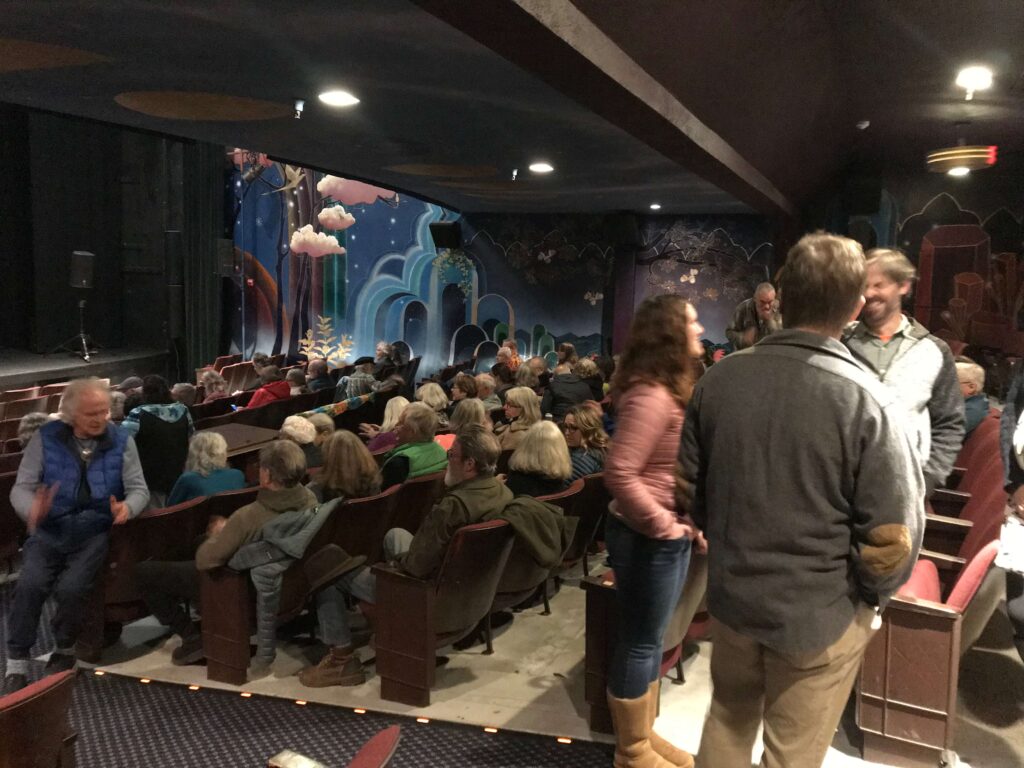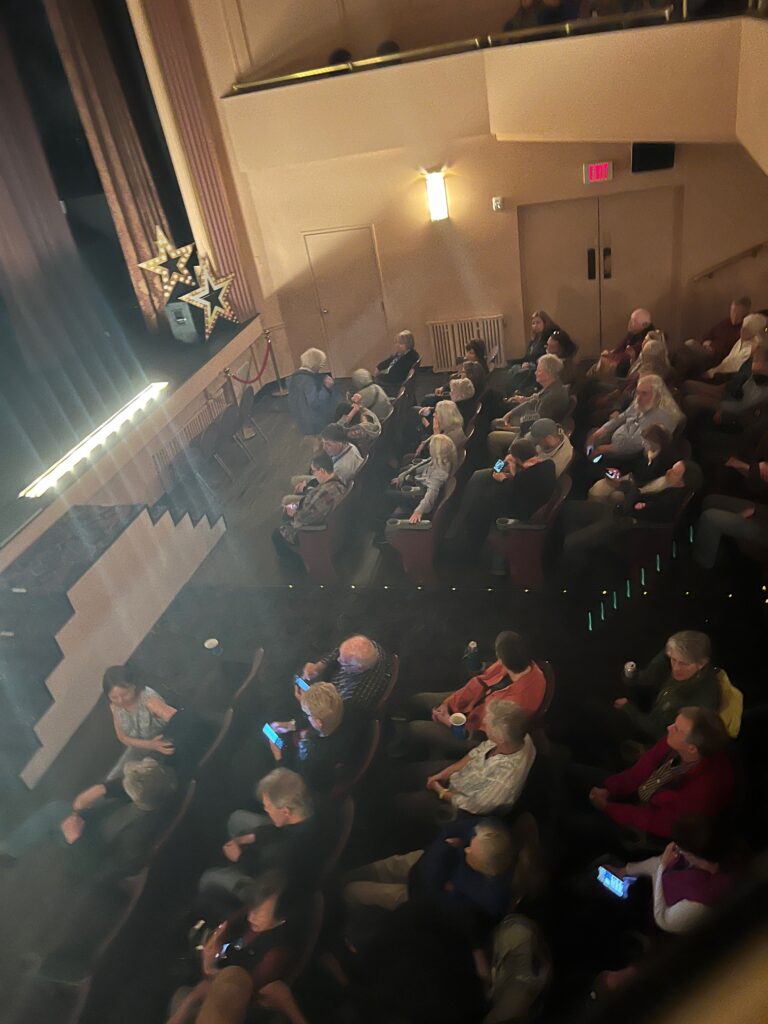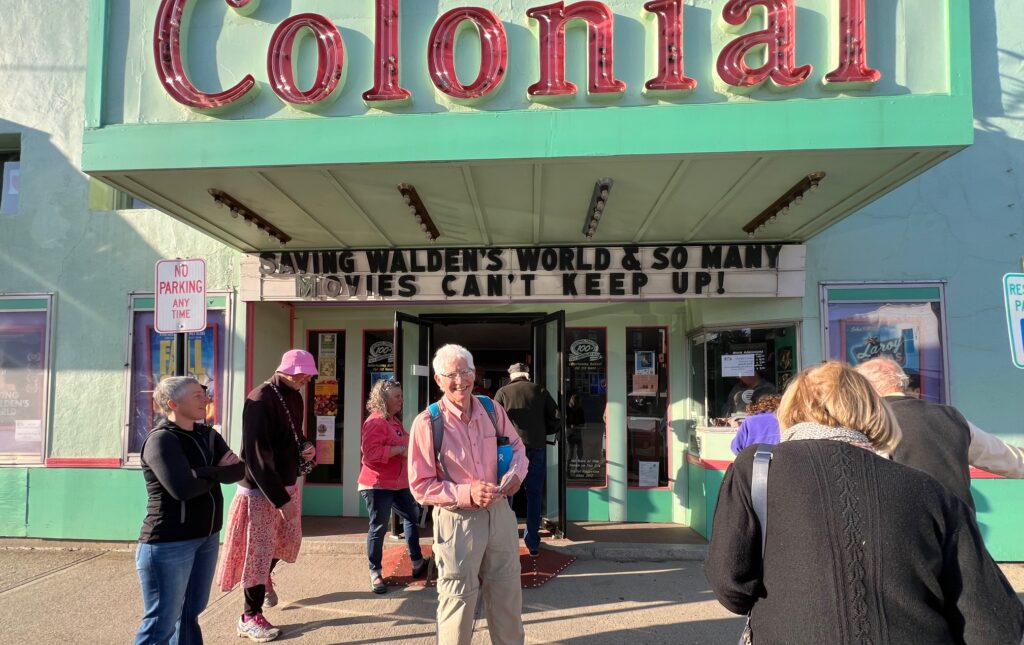Saving Walden’s World Comes to Fredericton
By Jim Merkel
Having sold out our screening at Belfast, Maine’s Colonial Theatre, we are now on the way to Fredricton, New Brunswick. Thank you, Belfast, for showing up in spades for your hometown filmmaker. Special thanks to the Colonial Theatre, our sponsors and community for coming with us to make this event a success.
Having been to Fredericton before on a book tour with Radical Simplicity, I can say that I’m really looking forward to this screening and spending time with the wonderful and warm community there. The screening will be on the University of New Brunswick campus, at Tilley Hall, Room 102 on May 29. Doors open 6:30, Film at 7:00. Q&A and socializing before and after.
You can get tickets here https://tinyurl.com/yvd2caab and if you’re in the New Brunswick area, please come and introduce yourself to me. We are just now considering ways to increase our impact with this film and want to hear from you. There is so much to be said about why I made this film. My hope is for audiences to be inspired to take action and mainly for finding a preferred future on this fragile planet
The documentary Saving Walden’s World…
…is a project with a long life, both in development and screenings, as it is now a featured selection at several global film festivals, including the Puerto Aventuras International Film Festival (PAIFF), Love & Hope International Film Festival, in Barcelona, Spain, Crown Wood International Film Festival in Kolkata, West Bengal, India and the Five Continents International Film Festival in Puerto La Cruz, Venezuela. This is a rare opportunity to meet the filmmaker and see why the film is garnering international attention, along with questions and answers and pre-show socializing.
Saving Walden’s World looks at what is working today and how these solutions can shape a better tomorrow. Director and writer Jim Merkel weaves a story that spans his early personal experience as a military subcontractor and his later studies of three countries where non-capitalist cultures thrive.
A Future Wish from a Parent to a Child
Saving Walden’s World is a visual poem and a promise from a father to the world’s children, a promise that provides a glimmering future within our reach, if we shift our thinking… Merkel started this research while watching Walden grow and this most certainly fueled his passion to take action, study and share his findings. Jim found a lot of working solutions in place right now. They are solutions you won’t hear about on the news, or much even in social media.
Jim Merkel asks us to Imagine… the world’s wealthy consume less, the poor exit poverty, fewer — yet healthier children are born, easing extinctions, hunger and climate change… A self-reinforcing cycle where all win. And if we can imagine, can we change? Perhaps the beginning of imagination is seeing ways solutions are working, so Jim takes us to places which have been identified as sustainable in terms of food, carbon footprint and localized economies. Saving Walden’s World may be the ultimate societal self-help film for an ailing planet.
Thanks so much,
Jim Merkel
Filmmaker, Author, Bicycle Activist
Want to join us?
Get tickets, share with friends and on social media and please be sure to sign up for news at www.savingwaldensworld.org
SWW trailer: https://tinyurl.com/29fhuh2a
Date: May 29, 2024 Time: 6:30 pm doors open, 7:00 pm
Place: 102 Tilley Hall at the University of New Brunswick
Get Tickets: https://tinyurl.com/yvd2caab

10 WAYS TO SLASH AT ECOLOGICAL FOOTPRINTS ON CAMPUS
1 Reduce, Reuse, Recycle, Refuse: Encourage your friends and faculty to reduce waste by using reusable items such as water bottles, lunch containers, and bags. Refusing is the most powerful action – shop local, organic, unpackaged, and refuse products from harmful companies.
2 Energy Conservation: Work together with the campus community on energy reduction targets, while trying your best to model the change by turning off lights when not in use, using natural light when possible, and unplugging electronics when not in use. Create a net-zero carbon plan that prioritizes energy reduction, efficient systems and appropriate solar and wind energy.
3 Water Conservation: Encourage the facilities managers to work with students to save water by fixing leaks and installing low-flow faucets. The campus community can do their part by taking shorter showers and turning off faucets when not in use.
4 Transportation: Work to create a culture of active transportation including cycling, walking and hiking while working with administration to ensure a network of safe bike lanes and traffic-calmed streets. Work to create covered bike racks, showers for bike-commuters, bike racks on buses, and expand carpooling and public transportation to reduce carbon emissions and energy use.
5 Food Waste: Work with administration to create zero-waste dining that eliminates single-use items while encouraging people to take only what they can eat.
6 Green Spaces: Encourage the administration to work with the campus community to promote the preservation and enhancement of green spaces.
7 Education: Integrate sustainability into the curriculum to raise awareness about environmental issues and encourage students to take action.
8 Community Engagement: Encourage students to get involved in community sustainability initiatives such as regional multimodal transportation, land conservation, organic food-security, ending homelessness and poverty, and restoring damaged ecosystems.
9 Advocacy: Faculty and staff should encourage students who advocate for sustainable practices in their schools and communities. Form broad coalitions within the wider community to solve the most wicked problems faced on campus and in the greater community.
10 Lead by Example: Faculty, staff, and students can lead by example by practicing sustainable behaviors. This will encourage incoming students to do the same, creating a culture of sustainability that becomes the new normal.


